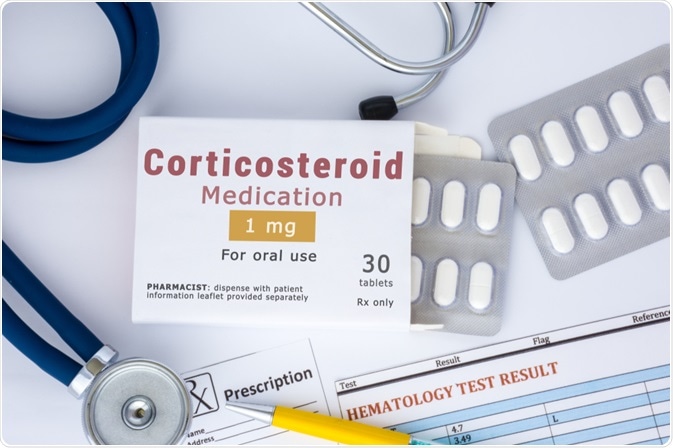Corticosteroids are a form of anti-inflammatory drug that is commonly used to treat issues associated with the joints, soft tissues, and connective tissues. Corticosteroids are artificially made but bear a close resemblance to the naturally occurring cortisol.

Image Credit: Shidlovski/Shutterstock.com
How do corticosteroids work?
Cortisol, which a corticosteroid mimics, is naturally produced by the adrenal glands. Cortisol has a role in the inflammatory pathway, which corticosteroids therefore also target. While inflammation can occur normally as a healthy response to foreign pathogens, such as bacteria and viruses, inflammation can also occur in inappropriate settings where it works deleteriously against the body. The inflammation can cause redness, warmth, swelling, and pain.
Corticosteroids help modulate the immune system, which is responsible for triggering or not triggering inflammatory responses, to stop inappropriate inflammation. Therefore, corticosteroids reduce the amount of tissue damage to the body. In addition to this, corticosteroids can depress the activity levels of the immune system by targeting white blood cells and their pathways.
The effects on white blood cells can vary. There is evidence that corticosteroids can affect the production of antibodies by inhibiting or lysing B cells. Other evidence indicates that corticosteroids affect the adhesion of white blood cells to the walls of blood vessels, which hinders the inflammatory response as the white blood cells cannot access the infected tissue. Corticosteroids influence many aspects of inflammation, but it is not entirely clear by what mechanisms they achieve such a widespread anti-inflammatory response.
When and how corticosteroids are given
Corticosteroids are used when the body’s immune system is not functioning correctly. Incorrect responses by the immune system, which lead to inflammation in the body, can cause tissue damage. Corticosteroids can prevent this by modifying the immune response. They can be used as the main therapy for certain conditions or can be a last resort that is sparsely used.
Generally, corticosteroids are used to treat rheumatologic inflammatory conditions, which means conditions that have inflammation of the joints, soft tissues, and connective tissues. This can include systemic vasculitis where the blood vessels are inflamed, myositis where muscles are inflamed, rheumatoid arthritis where arthritis is chronic, and systemic lupus erythematosus, which is generally characterized by improper functioning of the immune system.
There are several registered corticosteroid medicines. One of the most common is prednisone, which is used in the treatment of rheumatologic diseases such as arthritis and lupus. Other corticosteroid medicines include cortisone and methylprednisolone.
The method of administering corticosteroids can vary, depending on what the desired effect is. The administration method can lead to differences in how quickly corticosteroids are dissolved and how long they remain in circulation in the body. Corticosteroids can be given locally via injections, drops to the ears or eyes, and creams for the skin.
Systemic, or whole-body, administration of corticosteroids, can be done by oral ingestion of pills, intravenous injection, or injection to the muscle. The systemic administration leads to corticosteroids moving around the bloodstream to different sites in the body. Because of the potential side effects of this, local corticosteroid treatment is used when possible.
What Makes Corticosteroids so Beneficial? | Johns Hopkins
Possible side effects of corticosteroids
The side effects of corticosteroids can differ depending on whether the administration is systemic or local, the dose, the type of corticosteroid, and the duration of treatment. Some of the most common side effects include weight gain, mood changes, weakness in the muscles, easy bruising, and onset or worsening of diabetes, and high blood pressure.
The presence of side effects varies from person to person. The side effects listed above are generally not present when corticosteroid injections are given for arthritis, tendonitis, or bursitis on an occasional basis. If the corticosteroids are only used for a short amount of time, between a few days to weeks, none of the side effects may manifest.
If the use of corticosteroids is extended for a longer amount of time, such as for several months or years, side effects may increase. The use of corticosteroids for an extended period at a high dose is only used for severe conditions where the patient is at serious risk.
The side effects of corticosteroids can be minimized by using local corticosteroids when possible. Similarly, the smallest dose of medication needed to control the condition should be used. The dose can also be reduced over time, provided that the condition stays under control.
References
- Claman, H., 1975. How corticosteroids work. Journal of Allergy and Clinical Immunology, 55(3), pp. 145-151.
- Cleveland Clinic. 2020. Corticosteroids. [online] Available at: <https://my.clevelandclinic.org/health/drugs/4812-corticosteroids> [Accessed 27 September 2020].
- Cronstein, B., Kimmel, S., Levin, R., Martiniuk, F., and Weissmann, G., 1992. A mechanism for the anti-inflammatory effects of corticosteroids: the glucocorticoid receptor regulates leukocyte adhesion to endothelial cells and expression of endothelial-leukocyte adhesion molecule 1 and intercellular adhesion molecule 1. Proceedings of the National Academy of Sciences, 89(21), pp. 9991-9995.
Last Updated: Mar 15, 2021